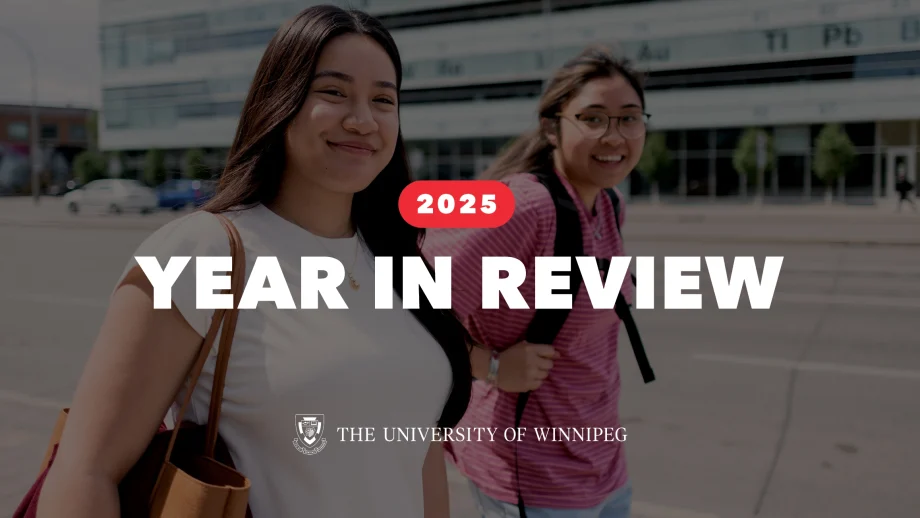WINNIPEG, MB – The public is reminded that the free Public Forum “Do Video Games Help Kids Learn?” takes place tonight, Thurs., Jan. 24 at 7:30 pm at UWinnipeg’s Convocation Hall, second floor, Wesley Hall, 515 Portage Ave.
Presented by The John D. and Catherine T. MacArthur Foundation & The University of Winnipeg, the event features MacArthur’s experts in digital media and education sharing their research and views. A reception follows the event.
The MacArthur Foundation has invested five years and $50-million to build the field of digital media and learning as a tool for understanding how digital technologies are changing the way young people learn, play, socialize and participate in civic life. This groundbreaking effort in research can be an essential and a constructive educational tool to help develop educational environments and social institutions that meet the needs of young people, especially the marginalized and the disenfranchised. This public forum is the first time the MacArthur Foundation is offering this educational session and discussion in Canada, which explores core issues facing young people in today’s digital world. Link: http://www.mitpressjournals.org/toc/dmal/-/5
Keynote speakers include Sasha Barab from Indiana University, Nichole Pinkard, Director of Technology at the University of Chicago’s Center for Urban School and Constance M. Yowell, Director of Education in the MacArthur Foundation’s Program on Human and Community Development.
BACKGROUND INFORMATION ON PRESENTERS
Dr. Sasha Barab is a leading expert in using games and virtual worlds for teaching science concepts and knowledge. He will discuss the virtual world project, Quest Atlantis, a three dimensional environment that uses commercial game strategies to immerse children, ages 9-12, in educational tasks. Dr. Barab is an Associate Professor at Indiana University.
Dr. Nichole Pinkard is the Chief Technology Officer and Director of Design and Research at the Center for Urban School Improvement at the University of Chicago. Dr. Pinkard has overseen the integration of technology into a network of charter schools in Chicago and has created the vision for the Digital Youth Network Program. This is an after-school program that facilitates urban youth in becoming discerning new media consumers and fluent media producers. Dr. Pinkard is a recipient of the Jan Hawkins Award for Early Career Contributions to Humanistic Research and Scholarship in Learning Technologies and an NSF Early CAREER Fellowship.
Julia M. Stasch is Vice President US Programs for the John D. and Catherine T. MacArthur Foundation. She is responsible for all aspects of the Foundation’s grant-making related to strengthening communities; improving teaching and learning; increasing access to stable and affordable housing; improving juvenile justice; advancing policies that promote mental health; supporting approaches to enhancing the competitiveness of the nation’s regions; and translating research and practical experience into effective social and economic policy.
Luke Walker is the Director of Education Programs at Taking It Global, a global non-profit online portal focused on empowering over 100,000 young people to get involved in improving their local and global communities. Walker has been responsible for developing programs and tools to help teachers and students leverage the vibrant TakingITGlobal.org community to support interactive and highly engaging e-learning experiences.
Dr. Constance M. Yowell is the Director of Education for the John D. and Catherine T. MacArthur Foundation. Yowell focuses on grants relating to public education, and on the implications for education of young people’s use of digital media. Prior to joining the Foundation, Yowell was an Associate Professor in the School of Education at the University of Illinois at Chicago, where her work included the study of reasons why Latino youth drop out of high school.
The John D. and Catherine T. MacArthur Foundation is a private, independent grant-making institution helping to build a more just and sustainable world. Through the support it provides, the Foundation fosters the development of knowledge, nurtures individual creativity, strengthens institutions, helps improve public policy, and provides information to the public, primarily through support for public interest media. With assets of more than $6.4-billion, the Foundation makes approximately $260-million in grants annually. More information is available at www.macfound.org.
The University of Winnipeg is one of Canada’s leading post-secondary institutions. Consistently ranked in the Top-10 in the country on an annual basis by both Maclean’s Magazine and The Globe & Mail newspaper, The University of Winnipeg is a leader in academic excellence, Aboriginal education, environmental studies & sustainability, and theatre & the arts. The University of Winnipeg is committed to improving access to post-secondary education for all individuals, especially those people from non-traditional communities. Find out more by visiting www.uwinnipeg.ca.




